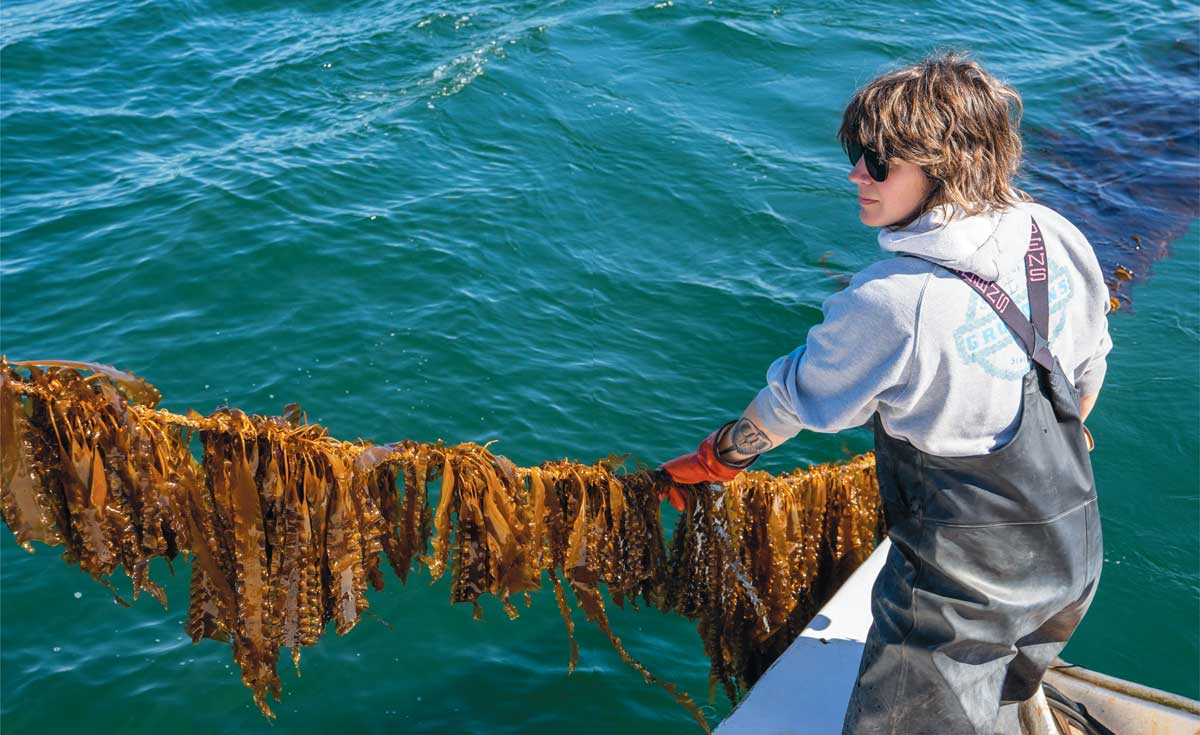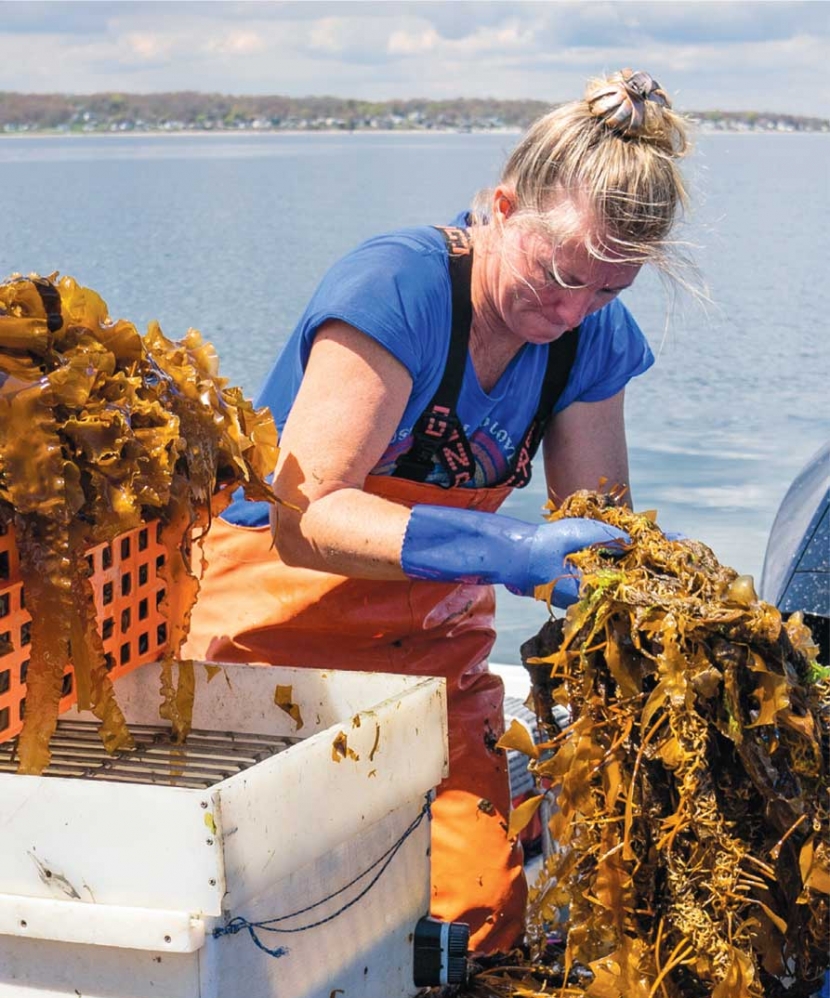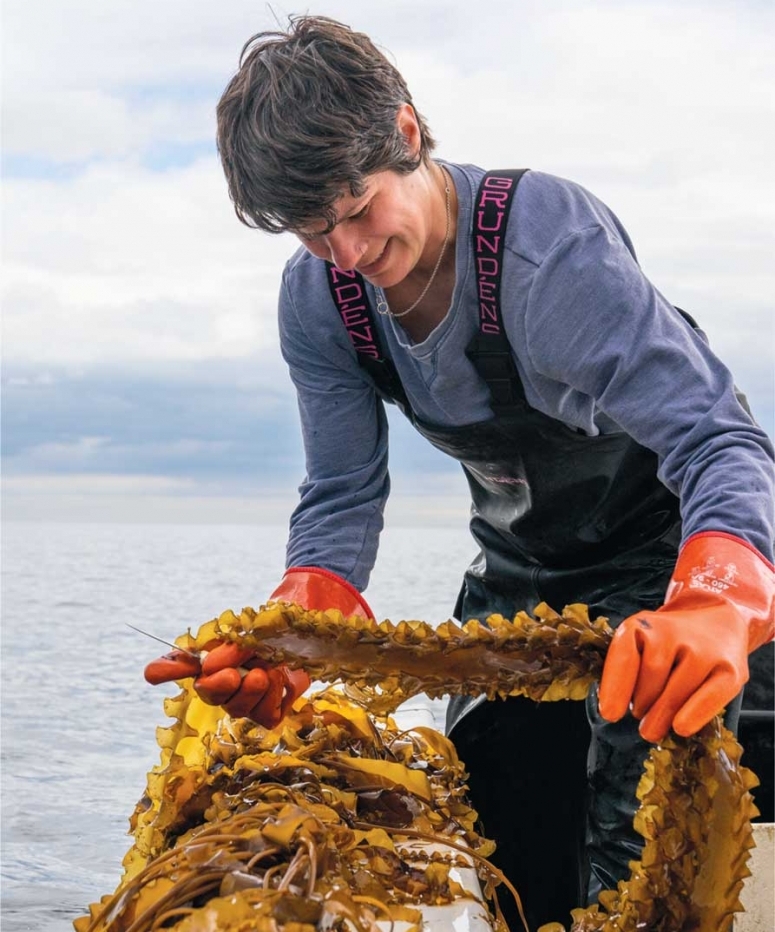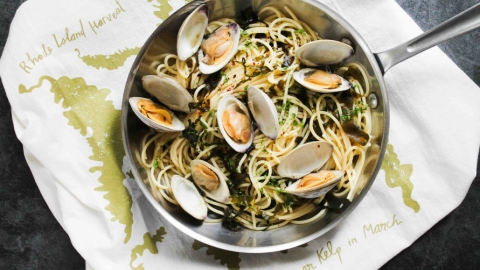Sugar Kelp: Spring's Sweet Revival
As the spring season unfolds, bringing with it a bounty of fresh flavors, there’s one ingredient making waves for its sustainability and versatility: sugar kelp! Championing this climate-friendly springtime treasure are local kelp farmers Suzie Flores from Stonington Kelp Company and Azure Cygler of Rhody Wild Sea Gardens. Their dedication to kelp farming embodies a commitment to environmental steward-ship and community vitality. Together, alongside the Sugar Kelp Cooperative, they’re not only cultivating a nutrient-rich superfood but also nurturing a sustainable culinary culture rooted in the rhythms of the seasons.
THE PATH TO KELP FARMING
For Flores, the allure of kelp farming was multifaceted. “We were very excited about the ecosystem services and environmental benefit that seaweed could have,” she says. “But beyond that, it felt like a good way to be engaged in a community, which was new to us.” Flores and her husband, Jay, started kelp farming seven years ago when they moved to Pawcatuck, Connecticut, with their family. Alongside the kelp farm, the couple run the Mechanic Street Marina. With the marina primarily being a summer business, the kelp farm allows them to operate in the winter season, keeping them and their boat on the water year-round.
Similarly, Cygler’s journey into kelp farming was driven by a desire for direct action and environmental stewardship. In her other job, she serves as fisheries and aquaculture extension specialist for Rhode Island Sea Grant. Through that job, she was familiar with the world of aquaculture in Rhode Island and the benefits that kelp offers to the environment. However, after an inspiring visit to Catherine Puckett’s kelp farm on Block Island, Cygler recognized that kelp farming could provide the hands-on, on-the-water activity she was craving. In 2020 she embarked on what she likes to call a “career chiropractic” and began her own kelp-growing career.
THE SUGAR KELP COOPERATIVE
In 2021, Flores and Cygler joined forces with fellow kelp farmers in the region (including Jonathan McGee of New England Sea Farms in Guilford, Connecticut, a founder of the cooperative with Flores) to establish the Sugar Kelp Cooperative. This collaborative endeavor arose from a shared recognition of the industry’s budding status in Southern New England. “The industry is so small, some would say nascent in this area,” Flores notes. “It made sense that if there is another person who is experiencing the same struggle as you, that you’d work together to overcome that.”
The cooperative serves as a hub of shared resources and collective support. From marketing initiatives to educational outreach, the cooperative empowers its members to navigate the challenges of kelp farming with unity, resilience and collaboration. As Cygler emphasizes, “It’s a group of individuals filled with trust and goodness, striving to elevate the Southern New England kelp industry.”
NURTURING HARVESTS FOR ENVIRONMENTAL HEALTH
Kelp farming involves several key steps throughout its seasonal cycle. It begins with setting kelp seed in November, typically done by wrapping spools of kelp seed around lines in the water. This process requires cool water temperatures for the kelp to thrive. The seed, derived from native wild sugar kelp, is carefully cultivated in laboratory environments until ready for deployment. Once set, the kelp grows over the winter months, with farmers regularly monitoring its progress and tending to any issues that arise.
As spring approaches and water temperatures rise, farmers must navigate challenges like increased fouling and the need to harvest before the onset of warmer weather. Harvest typically begins at the end of March and continues until late April or early May, depending on local regulations. Throughout this process, kelp farming not only provides a sustainable food source but also offers ecological benefits such as carbon sequestration, nutrient cycling, the creation of habitat and refuge for various marine species and buffering coastal areas from storm surges, thereby improving water quality and overall ecosystem health.
CULINARY GEM, NUTRITIONAL POWERHOUSE
Beyond its ecological benefits, kelp emerges as a culinary gem, rich in nutrients and bursting with flavor. “It’s very nutritious. It’s high in all the minerals and omega-3s that make fish so healthy, except you can get it from a macroalgae,” Flores says. Whether used fresh and blanched, or dried, kelp’s umami-rich flavor profile adds depth to dishes, enhancing the sweetness or savoriness. Additionally, its moisture-retentive properties make it an excellent addition to baked goods like sourdough bread or carrot cake, keeping them moist and flavorful. From fresh salads to savory soups, pastas and as chips, kelp lends itself to myriad culinary creations. Enjoying kelp doesn’t have to be complicated. For Flores’s family, a simple cucumber and blanched seaweed salad is a staple at home.
Cygler also highlights the ease of incorporating kelp into meals. “I take blades of my fresh kelp and dry them overnight in my window. I then crumple it in my hand and put it over everything I eat, like a seasoning. I have my kelp jar next to my salt and pepper shaker and use it daily.”
Whether incorporated subtly into everyday cooking or showcased as a standout ingredient, kelp offers a unique and nutritious addition to any culinary repertoire.
NEW ENGLAND KELP WEEK
New England Kelp Week, hosted by the Sugar Kelp Cooperative, is an annual event held in April dedicated to celebrating and promoting the consumption of kelp and supporting local kelp farmers like Flores and Cygler. This year the celebration will run April 11–22 and will bring together restaurants, breweries, distilleries and other food establishments in the region to showcase kelp-inspired dishes, beverages and products on their menus, raising awareness about the nutritional benefits and culinary versatility of kelp while fostering a sense of community among consumers, chefs and farmers. Participating establishments offer kelpthemed menu items, host cooking demonstrations, tasting events, educational workshops, restaurant dinners and art collaborations to help to foster enthusiasm for seaweed consumption and supporting local farmers throughout the harvest season.
Kate Masury is the executive director of Eating with the Ecosystem, a nonprofit whose mission is to promote a place-based approach to sustaining New England’s wild seafood.
New England Kelp Week
April 11–22, 2024
NewEnglandKelp.com
For more on these featured kelp farmers, visit StoningtonKelpCo.com and RhodyWildSeaGardens.com.
Find Chef Marc Murphy’s delicious recipe for Linguine with Clams and Kelp here.







